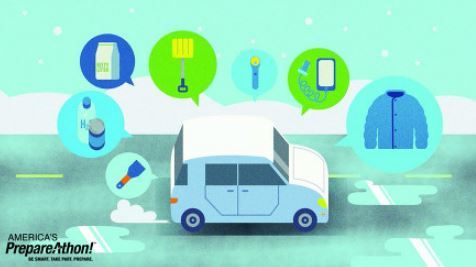emergency preparednessThe possibility of public health emergencies arising in the United States concerns many people in the wake of recent hurricanes, tornadoes, blizzards, acts of terrorism, and the threat of pandemic influenza. Though some people feel it is impossible to be prepared for unexpected events, the truth is that taking preparedness actions helps people deal with disasters of all sorts much more effectively when they do occur. The Cass County Health Department strongly urges every family in Cass County to prepare for an emergency before an event occurs. You can be prepared by having an emergency kit ready for any emergency that may affect our country to protect you and your loved ones. In the event of a natural disaster or man-made emergency event in Cass County, listen to your local radio or television stations for information. All county agencies will be working together to assure that all residents are safe. Cass County Health Department: 217-452-3057 Cass County Sheriff’s Department: 911 Cass County Emergency Services Disaster Agency Coordinator: 217-323-5555 Federal Emergency Management Agency American Red CrossCenters for Disease Control and Prevention Illinois Emergency Management Agency Environmental Protection Agency Department of Homeland Security Federal Bureau of Investigation Emergency Preparedness Focus - Extreme ColdPlan Ahead!Prepare for extremely cold weather every winter - it's always a possibility! There are steps you can take in advance for greater wintertime safety in your home and in your car. Prepare Your Home For WinterAlthough periods of extreme cold cannot always be predicted far in advance, weather forecasts can sometimes provide you with several days' notice. Listen to weather forecasts regularly, and check your emergency supplies whenever a period of extreme cold is predicted. If you plan to use a fireplace or wood stove for emergency heating, have your chimney or flue inspected each year. Ask your local fire department to recommend an inspector, or find one in the yellow pages of your telephone directory under "chimney cleaning." Also, if you'll be using a fireplace, wood stove, or kerosene heather, install a smoke detector and a battery-operated carbon monoxide detector near the area to be heated. Test them monthly, and replace batteries twice yearly. Your ability to feel a change in temperature decreases with age, and older people are more susceptible to health problems caused by cold. If you are over 65 years of age, place an easy to read thermometer in an indoor location where you will see it frequently, and check the temperature of your home often during the winter months. Insulate any water lines that run along exterior walls so your water supply will be less likely to freeze. To the extent possible, weatherproof your home by adding weather-stripping, insulation, insulated doors and storm windows, or thermal-pane windows. If you have pets, bring them indoors. If you cannot bring them inside, provide adequate shelter to keep them warm and make sure that they have access to unfrozen water. Pepare Your Car For WinterYou can avoid many dangerous winter travel problems by planning ahead. Have maintenance service on your vehicle as often as the manufacturer recommends. In addition, every fall: have the radiator system services or check the antifreeze level yourself with an antifreeze tester. Add antifreeze, as needed, replace windsheild wiper fluid with a wintertime mixture, and replace any worn tires, and check the air pressure in the tires. During winter keep your gas tank near full to help avoid ice in the tank and fuel lines. |

